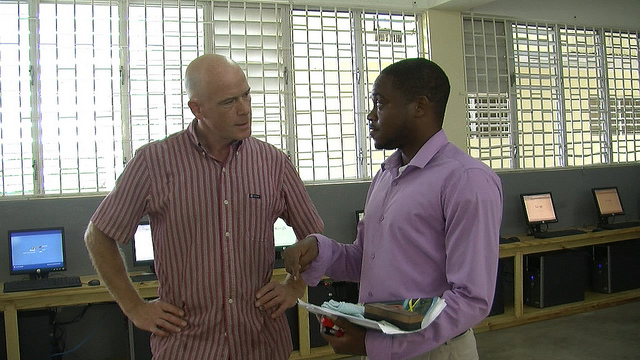Understanding the Impact of Educational Governance at the Local Level: The School Principal

On the local level, educational governance is organized into four levels including the local school board, the local superintendent, the local school district, and the principle. This article highlights the details of the school principle and the essential role they have within the educational system.
The principal is the ultimate authority at the school level and is responsible for governance of all aspects of the day-to-day operation of the facility. Principals report directly to the local superintendent or one of the deputy superintendents. High schools and middle schools may have an administrative team composed of a principal and several vice or assistant principals. While some elementary principals may have an assistant principal (depending on the size of the school), they frequently work solo and may be in charge of more than one school building. The job of the high school principal is generally considered the most demanding of the three and, consequently, high school principals are often paid more than their elementary and middle school counterparts.
Principals are expected to be instructional leaders in addition to carrying out other administrative duties. Like the superintendent, the principal is expected to be an educational generalist. Principals set educational standards and goals, establish school policies and procedures, supervise teachers and other personnel, monitor student progress, ensure appropriate record keeping, and act as a liaison with parents and other members of the community.
In the process of setting school-level policies, principals sometimes call for input from faculty/ personnel, and sometimes do not. Because they are ultimately responsible for ensuring that policies are observed, they must clearly communicate policy parameters to their staff and defend or explain policies to the public. Principals must thoroughly understand their school’s individual mission and ensure that policies support it.
One of the largest duties that a principal undertakes is the supervision and evaluation of professional and paraprofessional staff. Principals are also key players in the search, recruitment, and interviewing process for new staff members. They assign teaching duties, establish schedules, and when necessary, appoint staff to various committees. Principals are responsible for informing their staff of recent developments at the school level and other important information, and this is mostly accomplished through scheduled staff/faculty meetings. These meetings also allow principals opportunities to request input into the decision-making process from school personnel. Principals are instructional leaders who often observe teachers and offer feedback and advice for improvement. They expect that teachers will keep them apprised of any out-of-the-ordinary occurrences in their classes that need the principal’s attention or input.
Principals are the final authority on administering student discipline within the school. They also have the last word on student assessment and grading. The principal has the right, in most schools, to overrule a grade assigned by a classroom teacher. Principals, sometimes in concert with other professional staff, decide if students will be retained in their current grade level or will be passed into the next.
Principals create the schedule for the entire school year, assigning teachers to classes and establishing all classes within a set time frame. They manage school budgets, set priorities, and determine how funds will be allocated. They are also the most readily identifiable public personality of the school and are therefore the primary representative of the school, its policies, and its achievements to parents and the community at large. In 1991 both the National Association of Elementary School Principals (NAESP) and the National
Association of Secondary School Principals (NASSP) created a list of proficiencies that exemplify effective principals. High-performing principals provide extensive leadership and decision making, encouraging others to attain excellence while promoting a sense of community among all school members.
They communicate effectively and model appropriate behavior, as they involve all concerned stakeholders (parents, community members, students, educational personnel) in decision making and attempts to reach consensus. High-performing principals promote and enhance learning by supporting the development of an excellent curriculum and instructional delivery process. They supervise their staff’s professional development and encourage them to learn and to grow as educators. Effective principals also ensure that assessment measures are in place, and that the assessments accurately measure the progress of both students and staff. They organize and manage all aspects of the school’s day-to-day workings, which include staffing, making schedules, managing time, implementing policies, and maintaining the building. Principals also prepare and manage the school-based budget. Finally, effective principals are politically astute and can garner the support of key community players and deal with political issues that may arise.
Elementary and secondary schools will be negatively affected by a predicted shortage of principals in the years to come. The expected shortfall will be due in part to the number of expected retirements of current principals. A greater impact, however, can be found in the attitudes of current teachers toward the position of principal. Most teachers indicate they would not seek an administrative position, because they feel principals are not paid well enough, considering the responsibility they carry. Many teachers assert that the position demands far too much time and commitment. It is too difficult, they say, to attempt to address all the needs of the school while meeting the demands of all concerned stakeholders (e.g., parents, the local school board, businesses, and state and federal educational authorities).
As an aspiring teacher, your relationship with your principal will be important, because he or she will have a direct impact on your job. You may or may not have an opportunity to express your wishes regarding what you teach. Your principal will also visit your classroom frequently and will likely be in charge of your performance evaluation. And your principal will be instrumental in helping you to maintain discipline in your classes and will often serve as a bridge between you, and parents, and the community. A new teacher’s success often depends largely on the relationship he or she has with the principal.
Remember the school principle serves in a vital role and works closely with all internal and external stakeholders. Therefore their role within educational governance is necessary for the operation of their school. Continue to read articles in this segment to learn about the other levels of educational governance at the local level.
What You Need to Know as an Educator: How to Deal with a Difficult Principle
Working with people can be very difficult especially if the person is your boss and you may not agree with their leadership style or discussions. As a teacher you may find it very difficult to work with your principle. Therefore this article provides tips for surviving the work place as you continue to invest in the lives of students.
Being a teacher was handsdown one of the most difficult things that I have ever done in my life. It was also, however, the most rewarding. I had excellent relationships with my colleagues and my building principals, who served as a support system during times of uncertainty and difficulty. I hope that you will have a similar experience, but I also want you to be prepared if you do not.
Your school principal serves as an immediate supervisor and has direct authority over the day-to-day management of the school. A principal can be an invaluable ally in your pursuit to educate students or can be a nuisance and make your life a living hell. Here are some strategies that you can use to deal with a difficult principal.
Take steps to open the lines of communication, and build a healthy reciprocal relationship with your principal. There is nothing wrong with appeasing your principal, and even “kissing up.” Your objective is to coexist with him or her and be the best teacher that you can be. Document every interaction between you and your building principal. If there is a problem down the line, you will have a detailed record of your interactions. Also, if your colleagues witnessed important interactions between you and your principal, be sure to record their names and other pertinent information.
If you feel as though your principal is bullying or persecuting you, try to stay calm and remain professional. Give the principal the benefit of the doubt at first, but if he or she crosses the line, it may be time to seek help. This is especially true if you feel that you have done all that you can to solve the problem.
If you do decide to seek outside help or advice, your union representative will be your first line of defense. The representative will inform you of your rights and help you devise a plan for dealing with the situation. If your principal is exhibiting bullying behaviors toward you, odds are that he or she has also bullied others. There is a possibility that your union representative has fielded complaints about this principal in the past.
If the problem does not subside with time, I would either transfer to another school in the district or simply leave. If you are not satisfied with this course of action, perhaps you should report the principal’s actions to someone further up the chain of command, but make sure you have done your part by having a heart-to-heart with your principal. Remember, it’s not your fault, and everyone, even principals, must face the consequences of their actions.
We would like to think that principals are all altruistic people who treat everyone fairly and have our best interests at heart, but in the end they are human just like us. I have seen strong relationships between teachers and principals devolve into toxic ones within the blink of an eye. The funny thing is that it was usually over some petty matter or a product of miscommunication.
There may come a time when you have to deal with a difficult principal, and I just want you to be prepared. If you implement these strategies, you should have no problem standing up for yourself. Remember why you love to teach and use these tips to deal with your principle.





